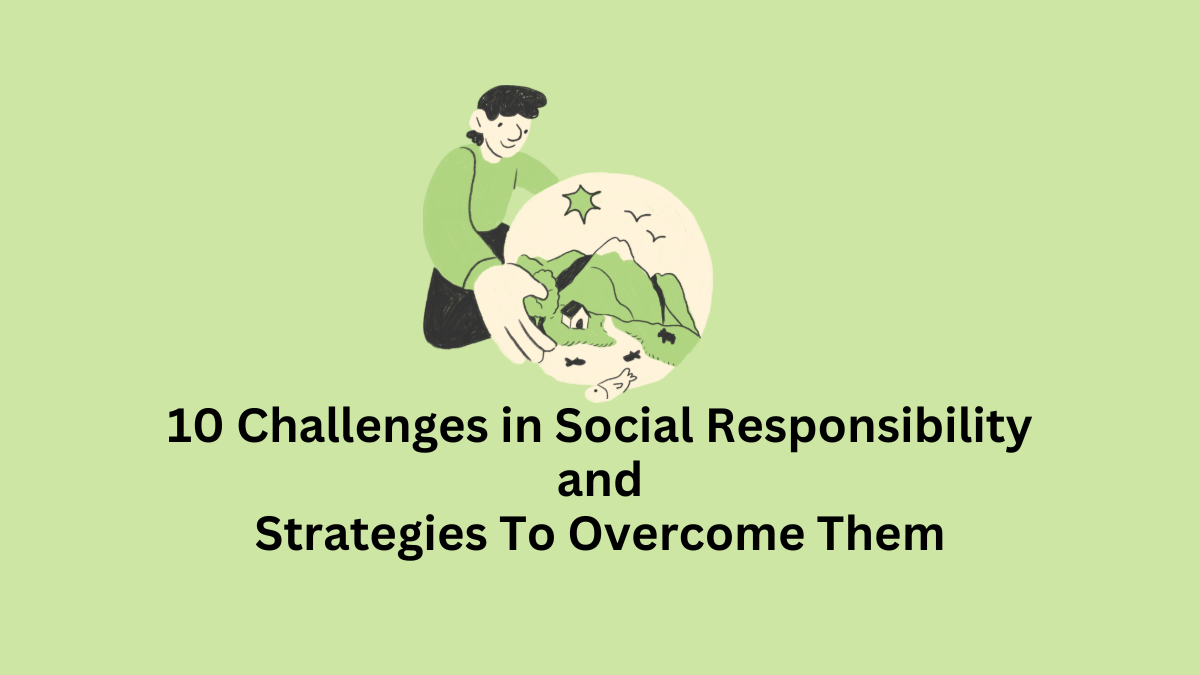Challenges in Social Responsibility
Social responsibility, while crucial for businesses and organizations, comes with its share of challenges. Understanding these challenges and devising strategies to overcome them is crucial for effective implementation.
In this article, we will explore the 10 major challenges in social responsibility and strategies to overcome them.
Lack of Clear Framework
One of the primary challenges is the absence of a clear framework for implementing social responsibility initiatives. Without a defined roadmap, organizations may struggle to identify priorities and allocate resources effectively.
Strategy: Develop a comprehensive social responsibility strategy aligned with the organization’s mission and values. Clearly define goals, metrics for success, and implementation plans to provide direction and clarity.
Limited Resources
Limited financial and human resources can hinder the implementation of social responsibility initiatives. Small and medium-sized enterprises, in particular, may face constraints in investing in CSR activities.
Strategy: Prioritize initiatives that offer maximum impact with available resources. Explore partnerships with other organizations, leverage volunteerism, and seek funding opportunities to expand CSR efforts.
Resistance from Stakeholders
Resistance from internal and external stakeholders, including employees, management, shareholders, and the community, can pose a significant challenge. Skepticism about the value and impact of CSR initiatives may hinder progress.
Strategy: Foster open communication and engagement with stakeholders to address concerns and build support for social responsibility efforts. Provide education and training to increase awareness and understanding of the benefits of CSR.
Measuring Impact
Measuring the impact of social responsibility initiatives is complex and often subjective. Quantifying social and environmental outcomes, such as community development or carbon footprint reduction, can be challenging.
Strategy: Develop clear metrics and evaluation frameworks to assess the impact of CSR activities. Utilize both qualitative and quantitative indicators, such as surveys, key performance indicators (KPIs), and impact assessments, to measure progress and communicate results.
Balancing Short-Term and Long-Term Goals
Balancing short-term financial objectives with long-term social and environmental goals is another challenge. Organizations may prioritize immediate profitability over investments in sustainability and social welfare.
Strategy: Adopt a strategic approach to CSR that integrates short-term business priorities with long-term sustainability objectives. Emphasize the business case for CSR, highlighting the long-term benefits, such as enhanced reputation, customer loyalty, and risk mitigation.
Read More: Challenges in Business Ethics
Complex Regulatory Environment
Compliance with diverse and evolving regulations related to social responsibility can be daunting. Navigating complex legal requirements across jurisdictions and industries adds complexity to CSR implementation.
Strategy: Stay informed about relevant laws and regulations governing social responsibility, including labor standards, environmental regulations, and reporting requirements. Develop robust compliance programs and engage legal experts to ensure adherence to regulatory obligations.
Supply Chain Challenges
Managing social responsibility across global supply chains presents unique challenges. Ensuring ethical sourcing, labor practices, and environmental stewardship throughout the supply chain requires collaboration and transparency.
Strategy: Implement supply chain transparency initiatives to track and monitor supplier practices. Establish supplier codes of conduct, conduct audits, and provide training to suppliers to promote ethical behavior and sustainability.
Read More: 10 Challenges in Workforce Diversity
Cultural and Ethical Differences
Operating in diverse cultural and ethical contexts can complicate social responsibility efforts. Differences in values, norms, and expectations may require tailored approaches to CSR implementation.
Strategy: Conduct thorough cultural and ethical assessments to understand the social context and stakeholder expectations in different regions. Adapt CSR strategies and initiatives to align with local customs, values, and preferences while upholding universal ethical principles.
Public Perception and Reputation Management
Negative public perception or reputational damage resulting from perceived failures in social responsibility can undermine organizational credibility and trust.
Read More: 10 Challenges in Employee Empowerment
Strategy: Proactively manage reputation by transparently communicating CSR efforts and outcomes. Respond promptly and transparently to stakeholder concerns and criticisms. Demonstrate commitment to continuous improvement and accountability in social responsibility practices.
Integration into Business Strategy
Integrating social responsibility into core business strategy and operations can be challenging, particularly in industries where profit maximization traditionally takes precedence.
Strategy: Embed social responsibility into organizational culture, governance structures, and decision-making processes. Align CSR goals with business objectives, incentivize responsible behavior, and integrate CSR considerations into performance metrics and incentives.
Hence, these are the 10 common challenges in social responsibility and strategies to overcome them.
Read Next: 10 Challenges in Participative Management
